Spiritual Wellness Tourism
Bhutan travel information
About Across Bhutan
Across Bhutan travel agency offers Organized Tours & Custom Tours through Bhutan’s tranquil landscapes.
Contact us
Spiritual & Wellness Tourism in Bhutan: A Journey to Inner Peace
Discover Bhutan as a sanctuary for the soul—a Himalayan kingdom where spirituality, mindfulness, and well-being are not just practices, but a way of life.
Through its Buddhist monasteries, meditation retreats, and traditional wellness therapies, Bhutan invites travelers to embark on a profound inner journey.
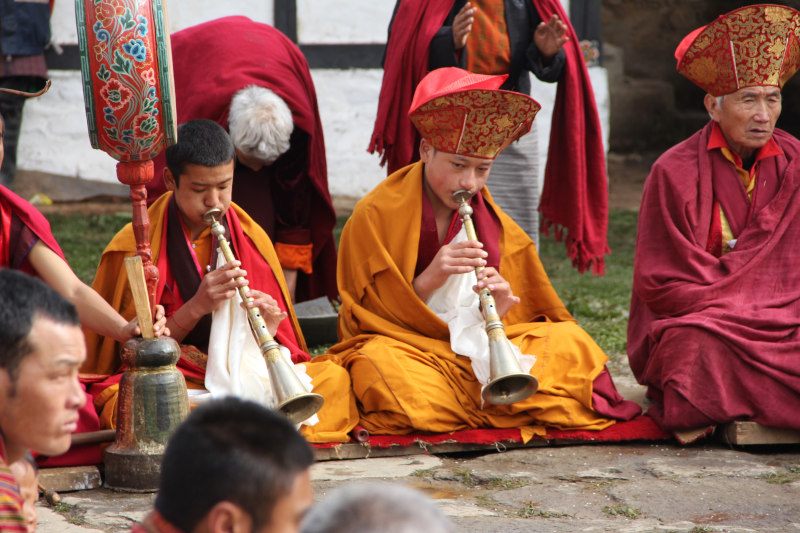
Bhutan: A Land Where Spirituality Is a Way of Life
In Bhutan, spirituality is deeply woven into the fabric of everyday life. Guided by the principles of Vajrayana Buddhism-a mystical and esoteric branch of Buddhism that emphasizes rituals, meditation, mantras, and symbolic imagery as a path to enlightenment-Bhutanese people cultivate compassion, balance, and contentment.
These values resonate in their homes, schools, and even governance (Gross National Happiness). For Bhutanese, spiritual well-being is as vital as physical health.
Bhutanese spirituality emphasizes:
Daily prayer and rituals
Respect for all sentient beings
Living in harmony with nature
Simplicity, gratitude, and mindfulness
This makes Bhutan a perfect destination for those seeking a spiritual awakening, emotional healing, or time for introspection.
Spiritual Vocabulary to Know Before You Go
Before diving into Bhutan’s sacred sites and rituals, here’s a helpful list of commonly used spiritual terms you’ll encounter throughout your journey:
| Term | Meaning |
|---|---|
| Dharma | The Buddha’s teachings; the path to enlightenment |
| Karma | The law of cause and effect; every action has consequences |
| Sangha | The spiritual community, often referring to Buddhist monks/nuns |
| Lhakhang | Temple or sacred shrine |
| Chorten | Stupa or religious monument symbolizing enlightenment |
| Tsechu | Religious festival with mask dances (Cham) performed in monasteries |
| Bodhisattva | An enlightened being dedicated to helping others attain liberation |
| Ngöndro | Foundational spiritual practices in Vajrayana Buddhism |
| Puja | Ritual prayer offering for blessings, protection, or purification |
| Menchu | Traditional hot stone bath infused with healing herbs |
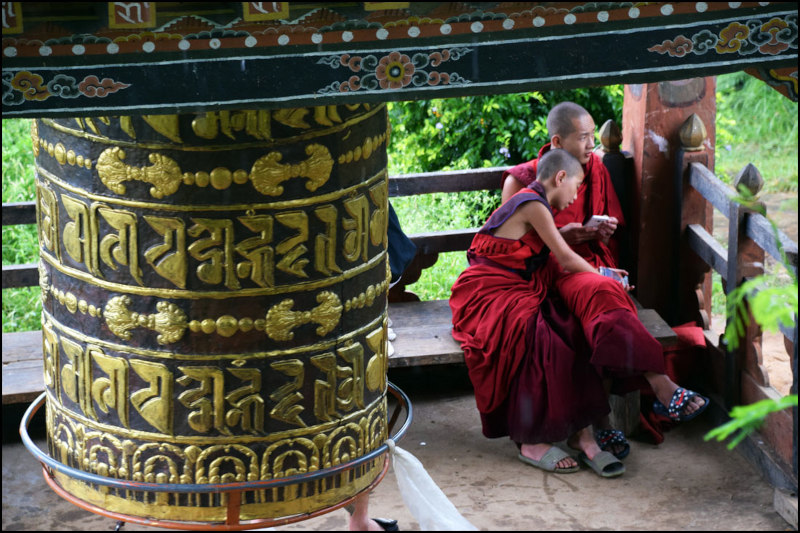
The Life of Monks in Bhutan: A Path of Discipline and Devotion
In Bhutan, becoming a monk is a respected and often lifelong calling.
Many boys enter monastic life as early as age six, joining a dratsang (monastic school) where they study Buddhist philosophy, scriptures, ritual arts, and meditation.
Monks live simply, rising before dawn to chant prayers, perform spiritual rituals, and engage in communal chores.
Their daily routine is centered on discipline, compassion, and mindfulness, reflecting the core teachings of Vajrayana Buddhism.
While life in the monastery is quiet and structured, it is also rich in meaning, offering a path to spiritual growth and service to the community.
Monks play a central role in Bhutanese society, conducting blessings, guiding ceremonies, and preserving sacred knowledge across generations.
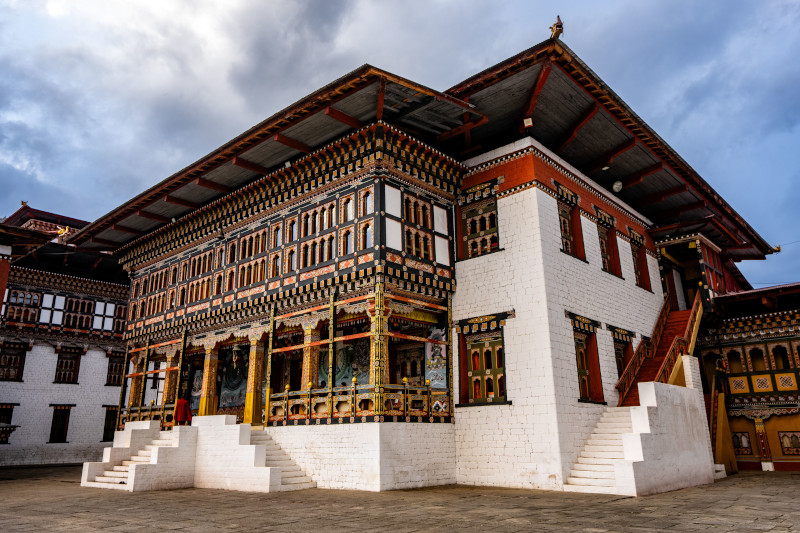
Sacred Spaces: Bhutan’s Buddhist Monasteries and Temples
From cliffside hermitages to centuries-old dzongs, Bhutan’s monasteries are both architectural marvels and havens of serenity.
Must-visit spiritual landmarks:
Paro Taktsang (Tiger’s Nest Monastery): One of the world’s most iconic meditation sites perched on a cliff.
Punakha Dzong: A spiritual and administrative center where sacred rituals and festivals unfold.
Chimi Lhakhang: Known as the fertility temple, it offers blessings for those seeking love and family.
These sites offer not only aesthetic wonder but also powerful energy, ideal for silent contemplation, pilgrimage, or spiritual photography.
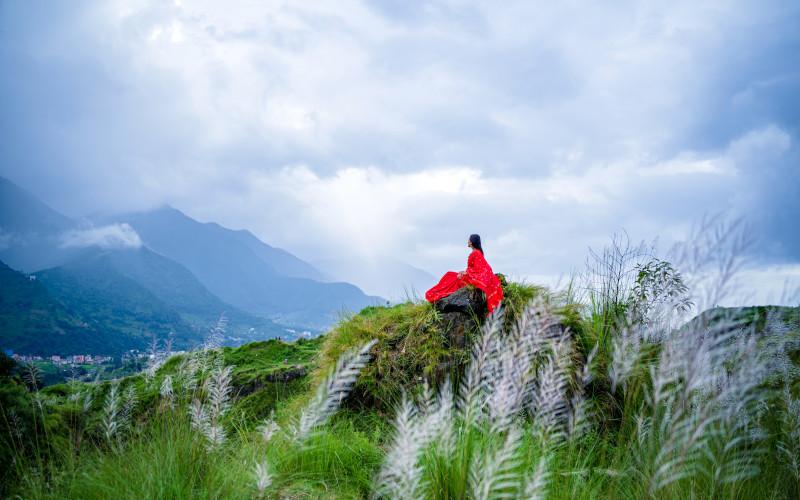
Meditation and Mindfulness Retreats: Rewiring the Mind
Meditation retreats in Bhutan go beyond relaxation-they aim for mental clarity, emotional balance, and spiritual transformation. Retreats often incorporate:
Shamatha meditation (calm-abiding): improves focus and mental peace
Vipassana meditation (insight): promotes awareness and insight into the nature of suffering
Silent retreats: reduce external stimuli, allowing deep inner work
Chöd rituals: advanced tantric practices focusing on cutting through ego
Many retreats are held in monastic environments, combining teachings from lamas, vegetarian meals, and digital detox.
Benefits:
Stress reduction and improved emotional regulation
Greater mindfulness and presence
Heightened compassion and reduced attachment
Clarity in life direction or soul purpose
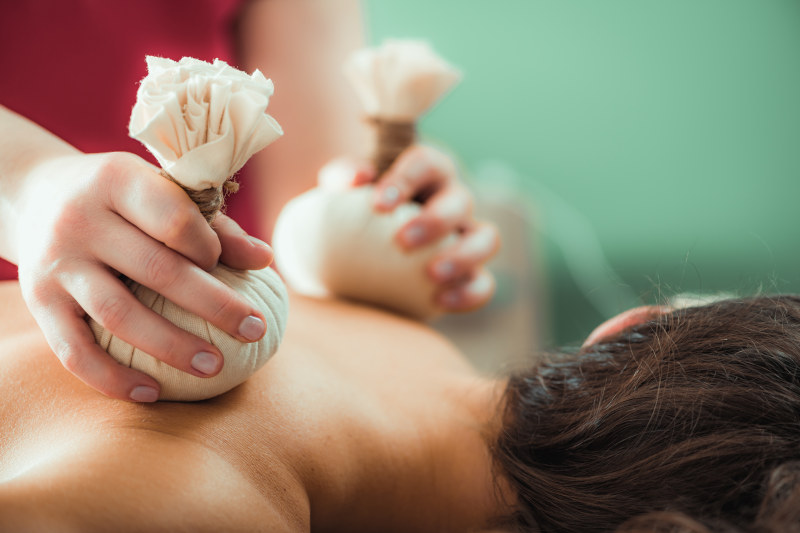
Traditional Bhutanese Wellness Practices: Healing the Body and Spirit
Hot Stone Baths (Menchu)
One of Bhutan’s most beloved traditional therapies, the Menchu involves immersing in a wooden tub filled with spring water heated by river stones roasted over fire until red-hot. The water is then infused with locally foraged medicinal herbs, such as:
- Artemisia (mugwort): relieves inflammation, boosts immunity
- Khempa (wild mint): supports skin health and soothes nerves
- Tsheringma herbs: sacred blend used for spiritual purification
Benefits:
- Relieves joint and muscle pain
- Improves blood circulation and detoxification
- Balances the body’s internal energies (wind, bile, phlegm)
- Used for spiritual cleansing before rituals or major life transitions
Many Bhutanese take Menchu baths before weddings, pilgrimages, or after childbirth.
Bhutanese Herbal Massages
These massages follow the principles of Sowa Rigpa, the Bhutanese traditional medical system. Therapists use herbal-infused oils made from:
- Juniper: purifies and uplifts mood
- Camphor & pine: anti-inflammatory, pain relief
- Tsheringma flower oil: known for vitality and female wellness
Massages are rhythmic, gentle yet firm, and focus on restoring harmony between body, mind, and spirit.
Benefits:
- Reduces chronic fatigue, stress, and anxiety
- Detoxifies the lymphatic system
- Boosts immune resilience
- Grounds emotions and improves sleep
Fasting Rituals and Spiritual Cleansing
In Bhutan, fasting (nyungné) is practiced in spiritual contexts, particularly around sacred days or during retreat. A typical fasting ritual might include:
- 1-2 days of complete fasting (no food or water)
- Mantra recitation, especially of Chenrezig (Avalokiteshvara)
- Observing noble silence and prostrations to purify karma
Fasting is often practiced in monasteries and considered an offering of devotion, not just abstinence.
Benefits:
- Cleansing of body and spirit
- Deep karmic purification
- Strengthened willpower and discipline
- Connection to compassion (the essence of Chenrezig)
This practice is powerful for those seeking a reset from material distractions or emotional burdens.
Yoga and Conscious Living in Bhutan
Bhutan’s yoga offerings blend Himalayan spiritual wisdom with natural healing environments. Unlike the commercialized retreats elsewhere, yoga in Bhutan is more introspective and devotional. Retreats typically include:
- Hatha or Yin yoga for grounding and balance
- Breathing exercises (pranayama) with high-altitude benefits
- Meditation with sunrise/sunset sessions
- Locally sourced vegetarian meals and herbal teas
Benefits:
- Restores nervous system balance
- Encourages mindful eating and conscious habits
- Enhances lung capacity in high-altitude settings
- Boosts emotional regulation and spiritual connection
Ideal destinations include Punakha Valley, Bumthang, and Paro, where natural elements complement inner practices.
Sound Healing and Sacred Instruments
In Bhutanese monastic culture, sound plays a vital role in meditation, rituals, and emotional healing. While not as commercialized as in other Himalayan regions, singing bowls, ritual bells (drilbu), drums (nga), and long trumpets (dungchen) are commonly used in both ceremonial and therapeutic settings. These instruments create vibrational soundscapes that are believed to harmonize the body, mind, and environment.
Visitors may encounter sound healing experiences during meditation retreats, pujas (rituals), or private wellness sessions in monasteries and wellness lodges.
Benefits:
Induces deep states of relaxation and meditative focus
Helps balance emotional energy and relieve anxiety
Enhances mindfulness and inner clarity
Supports energetic cleansing and chakra alignment
This practice is ideal for travelers seeking inner stillness, emotional release, and vibrational healing through ancient Bhutanese wisdom.
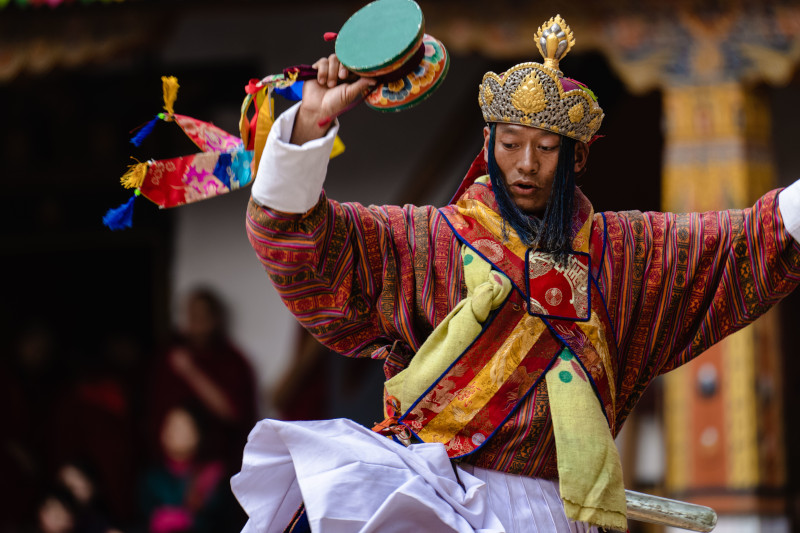
Travel Tips for Spiritual & Wellness Tourism in Bhutan
Respect and presence are key to absorbing Bhutan’s spiritual magic.
Do:
Wear long sleeves and remove shoes in temples
Walk clockwise around stupas and sacred sites
Join in daily prayer or incense offerings if invited
Leave digital distractions behind-embrace nature and silence
- Include a few days of “unscheduled time” for reflection-spontaneous moments often become the most meaningful.
Don’t:
Point your feet toward sacred objects or monks
Touch relics or thangka paintings
Use flash photography inside temples
Ready to visit Bhutan?
Design your custom Bhutan tour
We offer curated spiritual tours, wellness retreats, and conscious travel experiences that honor Bhutan’s deep traditions while adapting to your personal path.
Our packaged Bhutan tours
Bhutan travel information
About Across Bhutan
Across Bhutan travel agency offers Organized Tours & Custom Tours through Bhutan’s tranquil landscapes.







